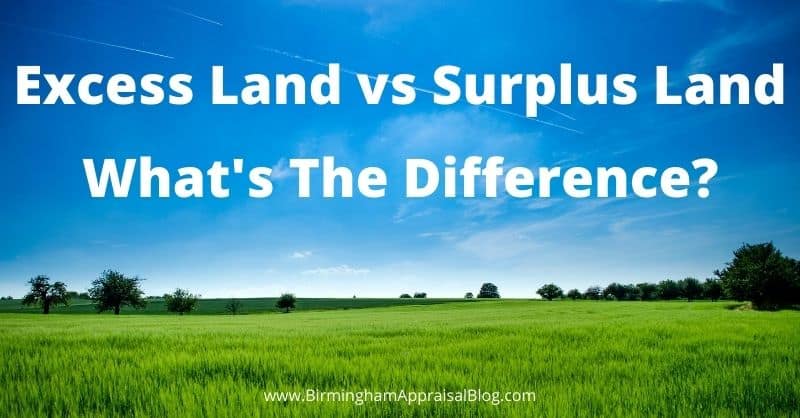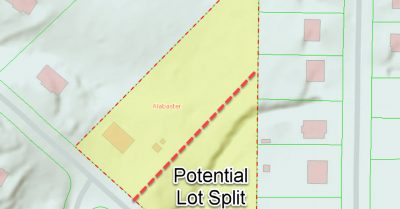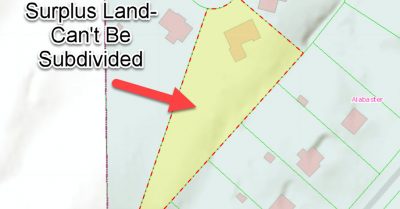How is Additional Land Valued In an Appraisal?
When I started my appraisal blog part of my mission statement was that I wanted to inform and educate consumers and anyone else who wanted to learn about how and why appraisers do what they do. As is the case almost on a weekly basis I had the opportunity recently to speak with a person who wanted to understand how land is valued with a residence within an appraisal.

To be more specific they were curious about how a house with a larger than typical lot would be handled in the appraisal. Would it add more value because of its larger size and if so how much?
It turns out that this is a fairly common question so I thought I would share it this week to help others understand that may have the same question. A larger than typical lot will be either considered excess land or surplus land depending on several factors.
If your question isn’t answered with what is discussed here feel free to leave a comment below or connect with me offline and I’ll help you any way I can.
Excess Land vs Surplus Land
A larger than typical lot will be classified as Excess Land or Surplus Land. We’ll take a look at each and see how they differ.
Excess Land refers to the land that is not needed to serve or support the existing improvement. The highest and best use of the Excess Land may be different than the improved parcel. It may be possible to sell off the excess land from the main parcel.
An example of Excess Land would be an adjacent vacant parcel that fronts a roadway and has easy access to the lot from the road.
On the other hand, Surplus Land is not needed to serve or support the existing improvement, however, it cannot be separated and sold off. Surplus Land does not have a different highest and best use and it may or may not contribute to the value of the overall parcel.
 An example of Surplus Land would be a home situated on a larger than typical parcel with no direct access other than traveling over the main parcel. The home or other improvements may be situated on the site such that no division of the property is possible without negatively affecting the functional and legal use of the property.
An example of Surplus Land would be a home situated on a larger than typical parcel with no direct access other than traveling over the main parcel. The home or other improvements may be situated on the site such that no division of the property is possible without negatively affecting the functional and legal use of the property.
The difference between these two scenarios is significant. In one situation the additional land has the potential to have a different highest and best use and there is the potential to legally separate them and sell off the additional land.
The second scenario does not allow the additional land to be sold off. The potential value of Surplus Land is much less than that of Excess Land.
In both situations, it is necessary to consider what is legally permissible considering the current zoning regulations. A certain zoning designation may allow parcels to be subdivided into smaller parcels with minimum size requirements.
In addition to size considerations, the zoning may have certain setback requirements for the front, back, and sides. If these guidelines cannot be met then it may not be possible to legally subdivide the parcel without possible zoning variances.
How Is This Handled In An Appraisal Report?
Within the appraisal report, the appraiser must consider the highest and best use of the parcel as if vacant. The four requirements for highest and best use consider whether it is legally permissible, physically possible, financially feasible, or maximally productive.
Here is what this looks like for the additional land:
- Legally Permissible– Will current zoning regulations and/or deed restrictions allow the split?
- Physically Possible– Is the topography, size, shape, or accessibility of the lot conducive to it being subdivided?
- Financially Feasible– Will the split produce more value than the cost to do it?
- Maximally Productive– Does the split produce the greatest return on the investment compared to other alternatives?
By applying the Highest and Best Use test to the land we are able to determine whether the land would be considered Excess or Surplus. By knowing which it is the appraiser will then know how to address it in the appraisal assignment.
Because excess land may have a different highest and best use and has the potential to be sold off it typically adds more value than surplus land. Surplus land does not have a separate value, as it cannot be sold off separately. It is “extra” land that may or may not contribute value to the overall property.
As you see there is a definite difference in how the land is handled and how it contributes to the value depending on its orientation. I hope this was helpful in understanding differences that exist when there is additional land.
Question
Do you have any other questions about Excess or Surplus Land? If so, please leave a comment below, and as always thanks for reading.
Hello Tom. Love your explanations. Even better it may help us with our current situation. We have an appraiser that we are currently working with on a refinance. She insists our 15 acres is excess land. Well. It’s not. It’s surrounded on all sides by neighbor’s lands, it would never pass a perk test because it’s sandstone rock and bluff. It’s mostly up hill. There’s no way to access the land legally except through the main entrance onto the main property, basically, driveway. It’s landlocked. Even our county appraiser said it should be considered surplus. How do I make our appraiser understand this? She didn’t even inspect the property to that extent. It makes great land for off road trails or maybe a goat farm.
Michelle, I think I would ask the appraiser to explain how it is supposed to be excess land. Let her know that based on your understanding of excess and surplus land it better fits the definition of surplus land. Also, you might ask her that if it is excess how would she split the land? This may give her a chance to reconsider her original analysis and she may change her mind.
Thank you so much for your response! We have spoken with her about it. But she seems to brush us off because we aren’t appraisers and she is. She did text me that in so many words. Maybe something will change.
You’re welcome and good luck!
SINCE THE APPRAISER IS CALLING IT EXCESS LAND WHY ARE THEY COMPLAINING THAT MOST LIKELY MEANS THAT THE APPRAISER VALUED IT HIGHER THAN IF IT WAS SURPLUS LAND
Over 50 years ago My boss took a took a r/w job from an elect utility co. As a gopher I found a series of tract sale over time, some of which had a wide easement across the rear of several lots out of the total, they each had different improvements, conditions and style. Those very deep lots sold in very short time in comparison. Doesn’t time equal money? Do apartment units backing to the busy street or r/r tracts have greater turn over, and how easy is that to verify?
It’s important to not go into an assignment with preconceived notions about whether values should be high or low. We should let the data speak for itself. I would think you could look at rent rolls to see what the turnover rate actually is.
That is great information. Thanks. I always learn something from you!
Thank you. My goal is to help non-appraisers understand the appraisal process.
Thanks,Tom
Enjoyed Reading
Great! I hope it was helpful.
Surplus = Same. Excess = Extra Money $$$$! Good info. Thanks Tom.
Thanks for sharing Lucas. This is a great way to remember the differences.
Isn’t excess land typically a separate or separate parcel with its own parcel number?
Both surplus and excess land are typically one parcel with one parcel number. Of the two, excess land would be the most likely to have its own parcel number since it can be sold off easier and may have its own highest and best use. If it were sold off it would need to be separated from the main parcel and the local assessor would then assign it a parcel number.
As usual – really good information! Thank you. Always enjoy reading
Thanks, David, I appreciate it. Glad you found it informative.
Nice job Tom. You know, it’s easy to mix up these terms. I think I need to invent some sort of clever saying to help me remember. And I’ve even written about this. Haha. Great job.
Thanks, Ryan. That would be great to come up with a little ditty to help remember it. I sometimes get them mixed up too. I didn’t know you wrote about it as well. I’ll have to look your post up.